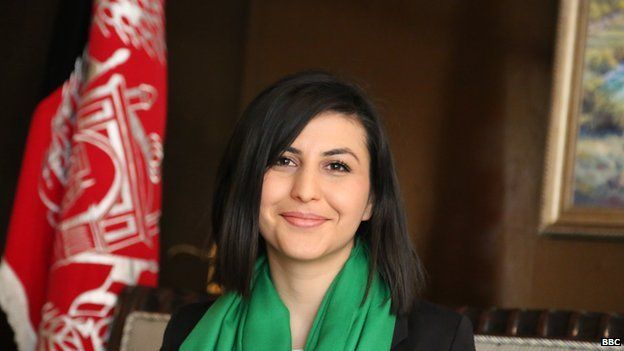Emotional return to a changing Afghanistan
- Published

On a cold November morning in 2007, I had kissed my family goodbye and left for Kabul airport - destination: London.
My mother had tears in her eyes. Not because she was letting me go, but because she was uncertain about when she would see me again.
Uncertainty was all we Afghans knew back then.
The roads to the airport were drenched with water, as if the whole of Kabul had been flooded.
It had been raining heavily, not unfamiliar weather in this part of the world.
I had spent my first 18 years in Afghanistan: the 1980s under communism (which I can hardly recall); the civil war of the 1990s (which still gives me nightmares); and the Taliban, who had robbed me of my childhood.
After hours journeying by road, I reached the airport, joining the crowds of fellow travellers.
From my seat on the plane, I gave Kabul one last look out of the window.
The snow-capped mountains surrounding the airport were the last thing I saw.
I decided to gamble my future on London, alone, with barely any personal belongings, and with no contacts at my final destination.
First lady Rula Ghani: "I would like to give women out there the courage and the possibility to do something about improving their lives"
Changing country
Seven years later, I was returning to my country of origin to meet the woman who may hold the key to stopping others like me leave in future.
Rula Ghani, a Christian, fell in love with and married Ashraf Ghani, a Muslim, 40 years ago.
His election to the presidency has elevated her to a position no previous Afghan first lady has filled in the same way for decades.
Before we met, I had to reacquaint myself with my home city, Kabul. A lot has changed in seven years, physically and emotionally.
Driving from the airport to the BBC office, my first observation was how the roadside trees had grown so much - they looked stronger.
Was that also true of the country?
From the car window, I was building a picture of how the country was changing.
Where the streets had previously been empty, I could now see Turkish, Italian and American restaurants. Other buildings had been constructed too.
There were no beggars on the streets - a good sign.
I could still see poverty. Not just financial poverty. But sometimes you recognise it in people's eyes: signs of emotional scars, of lost hope, which no politician or international aid could re-ignite.
An empowering future
The next day we were greeting the first lady, in the palace. We chatted for more than an hour about family, faith, her upbringing, her love of a country she was not born into, and most of all, her ambition.
I hope she can deliver her plan. It involves empowering people to earn respect for whatever role they decide to take up in society. It sounds simple, but I know it is not.
Then for some private time.
My family, whom I had not seen for seven years, travelled two hours across the city by public transport to meet me. Like so many other Afghans, because of the conflict, I do not have many relatives left.
The awkward initial formality between us very quickly gave way to laughter, tears and enjoyment of our deep family bond.
I remembered my conversation with the first lady hours earlier.
When she was newly married to Mr Ghani and moved first to Afghanistan, then to America, her family in Lebanon had been unable to speak to her for weeks at a time because of the lack of telecommunications.
I do not have that problem now. We all have smartphones. But no smartphone call comes close to being able to meet face-to-face.
So, I leave Kabul and my family again.
But I will return soon. Mrs Ghani is making that possible because she has invited me back to see her work in action in three months.
Hopefully, that will mean another longer, more planned family reunion.
The first lady's plan to empower more Afghans is already working for me.
Sana Safi is a Pashto TV presenter for the BBC's Afghan Service. You can hear her interview with Rula Ghani again online at bbc.com
- Published15 October 2014
- Published29 September 2014
- Published26 September 2019